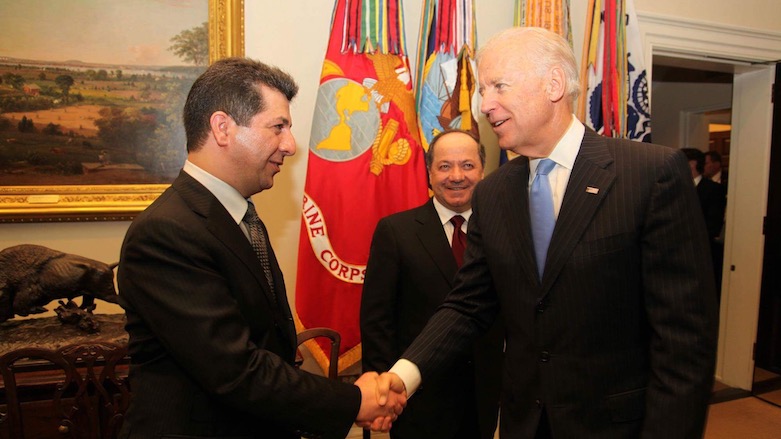Super Tuesday: Joe Biden and the Kurds

WASHINGTON DC (Kurdistan 24) – Today is America’s “Super Tuesday.” Fourteen states hold their primaries to determine candidates for November’s election. Those states include Tennessee, whose capital, Nashville, is home to the largest Kurdish community in America, as well as California and Texas, which also host substantial Kurdish populations.
The Republican nominee for president, of course, will be Donald Trump, as he runs for re-election. But the Democratic candidate is very much up for grabs.
On Monday, just in advance of Tuesday’s vote, former vice-president Joe Biden picked up several important endorsements.
Biden’s main rival, Bernie Sanders, is popular among the Democratic base, particularly younger voters. After all, he is promising to cancel their outstanding college tuition loans. But many others, including the Democratic establishment, are concerned that Sanders’ pledges of new, extensive welfare programs will be rejected by the broader public in November, leading not only to Sanders’ defeat, but that of other candidates on the Democratic ticket.
So moderates within the Democratic party are rallying around Biden. On Monday, two rivals – former Indianapolis mayor Pete Buttigieg and Minnesota Senator Amy Klobuchar – announced their support for Biden, as they dropped out of the race. Additionally, a former Texas Congressman, Beto O’Rourke, who had been briefly in the presidential contest in its earliest days, also announced his support for Biden.
The US national discussion, however, neglects an issue important to Kurdistan 24’s audience: Joe Biden has long been a friend of the Kurds, both as a senator and subsequently as Vice-President under President Barack Obama.
Joe Biden: “Masoud Barzani is a Good Friend of Mine”
In late 2017, this reporter chanced to see Biden at a local grocery store. People had gathered around him and were asking him questions. So I joined in with a question of my own, about Obama’s policy toward the Kurds.

“Masoud Barzani is a good friend of mine,” Biden responded, “and I wished we could have done more for the Kurds.”
“Why didn’t you?” I responded. “Turkey,” he answered.
Biden-Brownback Resolution for Federalism in Iraq
In 2007, Biden, then a senator from Delaware and the top Democrat on the Senate Foreign Relations Committee, joined with his colleague, Sen. Sam Brownback (R, Kansas), who chaired the committee’s Middle East subcommittee, to sponsor a bipartisan, non-binding resolution advocating a decentralized, federal system for post-Saddam Iraq.
Their resolution called for establishing three autonomous regions in Iraq, in accord with the 2005 constitution: Kurdish, Sunni Arab, and Shia Arab.
The measure was welcomed by the Kurdistan Regional Government (KRG), which issued a statement, affirming, “The people of Kurdistan, who have struggled for decades to achieve democracy and freedom, see in federalism the promise of stability and freedom from dictatorial regimes. We welcome this significant resolution in support of federalism, which guarantees the survival of Iraq on the basis of voluntary union.”
The resolution passed overwhelmingly, by a vote of 75 to 23. It was based on earlier work by Biden and Leslie Gelb, then the president emeritus of the prestigious Council on Foreign Relations.
Biden and Gelb laid out their ideas in a 2006 op-ed in The New York Times, as Operation Iraqi Freedom was going badly. They proposed decentralizing Iraq, “giving each ethno-religious group – Kurds, Sunni Arab, and Shia Arab – room to run its own affairs, while leaving the central government in charge of common interests.”
Each of the three regions would be “responsible for their own domestic laws, administration, and internal security,” Biden and Gelb wrote, while “the central government would control border defense, foreign affairs and oil revenues,” and “Baghdad would become a federal zone.”
Iraq’s Arabs – Sunnis, as well as Shia – rejected the proposal as tantamount to the partition of Iraq. Yet today, over a decade later, it is clear that the Sunnis would have been much better off if they had joined with the Kurds in supporting the plan.
Americans participating today, and subsequently, in the Democratic primaries –Kurds, as well as those who value the friendship of the Kurds and their sacrifices in common objectives, like combatting the so-called Islamic State – may well want to keep Biden’s position in mind, as they cast their ballots.
Editing by Karzan Sulaivany
